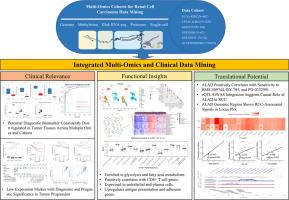ALAD as a prognostic biomarker regulates metabolism and immune responses in renal cell carcinoma through multi-omics analysis
IF 5
2区 医学
Q2 Medicine
引用次数: 0
Abstract
Background
Renal cell carcinoma (RCC) is a common malignant tumor with metabolic reprogramming and immune evasion features. δ-Aminolevulinic acid dehydratase (ALAD), a key enzyme in heme biosynthesis, has been implicated in cancer progression and treatment outcomes, but its role in RCC remains unclear.
Methods
This study integrated multi-omics datasets from TCGA, CPTAC, and GEO to analyze ALAD's expression, prognostic value, and functional implications in RCC.
Results
The results showed that ALAD expression is significantly downregulated in RCC tissues at both transcriptomic and proteomic levels, with low expression associated with advanced tumor stages, poor prognosis, and altered metabolic pathways. Functional enrichment and metabolic signature analyses revealed ALAD's association with metabolic processes and immune cell infiltration, particularly impacting CD8+ T cell-mediated immunity. Furthermore, ALAD expression correlated with sensitivity to specific anticancer drugs, suggesting potential therapeutic implications that required functional confirmation.
Conclusion
Overall, this study suggestes that ALAD is a promising prognostic biomarker and therapeutic target in RCC, highlighting its role in modulating the tumor immune microenvironment and metabolic landscape. These findings highlight an association between ALAD and RCC progression, though experimental validation is needed to confirm causality.

通过多组学分析,ALAD作为预后生物标志物调节肾癌的代谢和免疫反应
肾细胞癌(RCC)是一种以代谢重编程和免疫逃避为特征的常见恶性肿瘤。δ-氨基乙酰丙酸脱水酶(ALAD)是血红素生物合成的关键酶,与癌症进展和治疗结果有关,但其在RCC中的作用尚不清楚。方法本研究结合TCGA、CPTAC和GEO的多组学数据集,分析ALAD在RCC中的表达、预后价值和功能意义。结果RCC组织中ALAD在转录组学和蛋白质组学水平上的表达均显著下调,低表达与肿瘤分期晚期、预后不良和代谢途径改变相关。功能富集和代谢特征分析显示ALAD与代谢过程和免疫细胞浸润有关,特别是影响CD8+ T细胞介导的免疫。此外,ALAD的表达与对特定抗癌药物的敏感性相关,这表明潜在的治疗意义需要功能证实。综上所述,本研究提示ALAD在RCC中是一个有前景的预后生物标志物和治疗靶点,突出了其在调节肿瘤免疫微环境和代谢景观中的作用。这些发现强调了ALAD与RCC进展之间的关联,尽管需要实验验证来确认因果关系。
本文章由计算机程序翻译,如有差异,请以英文原文为准。
求助全文
约1分钟内获得全文
求助全文
来源期刊

Translational Oncology
ONCOLOGY-
CiteScore
8.40
自引率
2.00%
发文量
314
审稿时长
54 days
期刊介绍:
Translational Oncology publishes the results of novel research investigations which bridge the laboratory and clinical settings including risk assessment, cellular and molecular characterization, prevention, detection, diagnosis and treatment of human cancers with the overall goal of improving the clinical care of oncology patients. Translational Oncology will publish laboratory studies of novel therapeutic interventions as well as clinical trials which evaluate new treatment paradigms for cancer. Peer reviewed manuscript types include Original Reports, Reviews and Editorials.
 求助内容:
求助内容: 应助结果提醒方式:
应助结果提醒方式:


